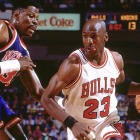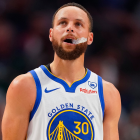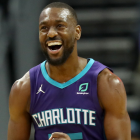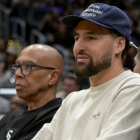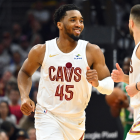The anticipation for "The Last Dance" documentary series chronicling Michael Jordan and the Chicago Bulls through the 1997-98 season, with plenty of flashbacks and backstory, was already nearing peak levels when it was originally set to debut in June during the off days of the NBA Finals.
But now that everyone is stuck at home without any sports to watch, people were drooling for this thing. The launch of the 10-part series was pushed to Sunday night, and the collective excitement and nostalgia was through the roof as the communal viewing experience re-entered the sports world's consciousness.
Twitter was ablaze as the first two episodes set the table for what is shaping up to be a remarkably unvarnished look at maybe the single-most fascinating athlete, and by extension team, in sports history. Below are nine major things we learned from the first episodes.
1. 'The Last Dance' almost never happened
Early on in Episode 1, Bulls owner Jerry Reinsdorf detailed why -- on the heels of winning the 1997 NBA championship, their fifth in seven years -- he and his staff were really considering getting out of the immediate championship-chasing business to turn their attention to the future.
"After the fifth championship, which was 96-97, we were looking at this team and we realized, other than Michael [Jordan], the rest of the guys were probably at the end of their high productive years," Reinsdorf said. "We had to decide whether to keep the team together or not. And we realized maybe this was the time to do a rebuild and maybe not try to win a sixth championship."
Jordan was set to be 35 years old during the 97-98 season. Scottie Pippen was going to be 32. Dennis Rodman, 37. Ron Harper, 34. Toni Kukoc was just shy of 30. But remember, the league was collectively older back then and these guys had just won a championship. Jordan, recounting his feelings from the time, was obviously not happy about the idea of a Chicago rebuild being floated.
"We had just finished winning our fifth title," Jordan said. "There was a lot of uncertainty. Management started talking about the franchise is going to change or we're going to rebuild. I thought it was unfair. I would never let someone who's not putting on a uniform and playing each and every day dictate what we do on a basketball court."
When Jordan says he would never let "someone" who not putting on a uniform dictate his basketball destiny, it is no secret who he's talking about. Which brings us to point No. 2 ...
2. Krause looks even worse in hindsight
Jerry Krause, who was the general manager of the Bulls at the time, has become one of the more unpopular sports executives and was duly loathed in Chicago as something of an adversary against his own team and star player. But time has a way of smoothing out our memories. The documentary resurfaced all the bumps of what was, frankly, a destructively rocky relationship between the team and the front office.
For starters, Krause was itching to get rid of coach Phil Jackson. Can you imagine? The guy had just won five championships in seven years. The first episode didn't do a whole lot to explain why Krause had it out for Jackson, but the portrayal of Krause is one of a highly insecure man so desperate for his slice of the credit that he wanted to, in effect, tear down an empire to prove he could rebuild it with different pieces. In the second episode, Krause's falling out with Pippen, who he also tried to get rid of, is detailed in great length (we'll get to that).
"Jerry had the little man problem," Mark Vancil, author of Rare Air, said during the doc. "He grew up a little, fat kid. Not a lot of money. He was always the underdog. And he just couldn't control that part of him that needed credit."
Reinsdorf recounts how he hired Krause in the first place, and notes that Krause's reputation in the sports world, as Reinsdorf conducted his due diligence, wasn't exactly sparkling.
"Jerry Krause was a scout for the White Sox," Reinsdorf said. "He was there when I bought the White Sox in 1981. After I bought the Bulls, he came to see me. He said he'd like to be the general manager of the Bulls. I asked around the league, and everybody I talked to said 'don't touch the guy'. He had a way of alienating people."
One story is recalled about Krause's open courting of then-Iowa State coach Tim Floyd to replace Jackson. In the summer following Chicago's fifth championship, basically the entire Bulls' organization, along with Floyd, was invited to his stepdaughter's wedding. Jackson was the notable exception. When you are the GM of a team that has won five of the last seven championships and you invite everyone but the coach of that team to an event, that is not by accident.
"I recall that," Reinsdorf said of the wedding incident. "And I think that was bad form on Jerry's part. ... It was sad that there was such an acrimonious relationship because Jerry Krause started Phil Jackson's NBA coaching career. Jerry Krause brought [Jackson] to Chicago as an assistant coach. If that hadn't happened, you never would've heard of Phil Jackson."
Reinsdorf, to be fair, defends Krause as much as he acknowledges his, shall we say, interpersonal shortcomings, calling him "one of the nicest, kindest, sweetest men I've ever known." But sometimes he would love people who didn't really love him back. And it would disappoint him.
The people who clearly didn't like Krause were the biggest names in the franchise. Jordan famously picked on him, mocking his weight in public. There was no way Krause could ever get rid of Jordan, but Jackson, he felt, was another story. This is amazing. Jackson might have been the biggest jerk in the world, who knows, but when you have a dynasty going, your job as the GM is to swallow your pride and let the stars shine.
If you're Krause and you don't like the way you're being treated or portrayed, leave. That's your decision. You don't break up a dynasty so you can feel better about yourself. Jackson was clearly the right coach for the team, end of story. Jordan even went so far as to say: "I said from Day 1, if Phil's not coaching, I'm not going to be a part of rebuilding."
After the 1997 championship, still in his uniform, Jordan said: "Phil should be the head coach, and I shouldn't be put in a position to have to make a choice to play for another coach other than Phil Jackson. ... Sadly, as it may be, I have choices. And I will not choose to play for another coach."
This is Michael Jordan! He's saying he will not play for another coach, and you're thinking about ... bringing in another coach? This is madness. Still, Krause was so adamant he could not work with Jackson anymore that even after Reinsdorf stepped in and got a one-year, $6 million deal done with Jackson, Krause told reporters that the 1997-98 season would indeed be the last one Jackson would spend on the Chicago sideline.
"Jerry called me in his office and said this is going to be your last year, I don't care if you win 82 games in a row," Jackson recalled during the documentary. "So I said 'fine' and I walked out of the room. And that was the only words that were exchanged."
To say this, even in private, to a coach who has led your franchise to five championships and whose team has shown absolutely no indication of falling off is crazy. But to then say it in public?
"Phil is the coach, Jerry's the owner. Those two needed to talk," Krause told reporters. "And we got [the contract] done and we're very happy to have it done. This will be Phil's last year as the coach of the Bulls. At the conclusion of the year, we'll look toward the future."
A future, as it turned out, without Jordan, who retired the next summer only to return three years later for two final seasons with the Washington Wizards. Nice call.
3. Olajuwon, the Olympics, and the importance of size in 1984
Given the opportunity, Rod Thorn, who was the general manager of the Bulls in 1984, admits he would've taken Akeem Olajuwon (now Hakeem) over Jordan had the Bulls had the No. 1 pick.
"Olajuwon would've been first by anybody who picked, including me," Thorn said.
In 1984, Olajuwon was indeed considered the best player in the draft, and make no mistake: The Rockets hit aces on their pick. "There was no one alive, not [North Carolina] coach [Dean] Smith, not Rod Thorn who drafted him, no one, none of the experts thought [Jordan] would become what he became."
On the other hand, Olajuwon was a can't-miss prospect who wound up delivering the Rockets two championships (both coming in the years Jordan went on his baseball sojourn). Hindsight is 20-20, but at the time Olajuwon was, at the very least, an extremely defensible pick, and probably the right pick.
Now, the Blazers taking Sam Bowie, a seven-footer out of Kentucky with a severe injury history? That was probably a bad call at the time, and over the years it's come to look even worse. Portland had Clyde Drexler, who played the same position as Jordan, and back then the NBA didn't play the same position-less style that's played today, which not only encourages but in many ways necessitates having multiple wings with Drexler and Jordan's size and skill.
In 1984, it was a big man's game. It was no coincidence the first two players drafted were seven-foot centers. Even after Jordan was drafted, Rod Thorn quipped to the media: "We wish he was 7-1, but he isn't." The footage of former Knicks star Walt Frazier questioning Jordan's ability to be a franchise player is telling.
"Michael's got to realize he's not seven foot, so he's not going to carry a team in the NBA," Frazier said at the time.
Again, it was a big-man's game. Even when Magic Johnson took the league by storm in leading the Lakers to a title in his rookie season of 1979-80, he played the Finals as a center. He was 6-foot-9, as was Larry Bird. Jordan, meanwhile, was listed at less than 6-foot-6.
Still, it's possible none of that would've mattered had the draft been held just a few months later, after the 1984 Olympics, in which Jordan led the U.S. to a gold medal while putting on a show worthy of U.S. coach Bob Knight calling him "the best basketball player that I've ever seen play."
"The reality is, we were lucky the draft was before the Olympics," Thorn said in the documentary. "Michael became the most popular amateur basketball player in the world because of the Olympics."
The Bulls got him a few months before everyone found that out.
4. The North Carolina years
One of my favorite stretches of the first episode was when it skimmed through Jordan's North Carolina years. At one point, Jordan's mother, Deloris, reads a note Michael wrote to her during his freshman year at UNC in which he asks for money because he only has $20 in his account.
This is a particularly telling lens to look back through as the idea of the paying college athletes, who generate millions of dollars for their coaches and tens of millions for their universities and hundreds of millions for the NCAA, for their services has become an increasingly controversial topic.
But Jordan wasn't worried about that at the time. What he was worried about was becoming the best player to ever play at North Carolina. From current UNC coach Roy Williams:
"Michael Jordan tells me one day he wants to be the best player to ever play [at North Carolina]. I said, 'well you've got to work harder than you did in high school.' He said 'I worked as hard as everybody else,' and I said "oh, excuse me, I thought you just told me you wanted to be the best player to ever play here, and he said 'I'm gonna show you, nobody will ever work as hard as I work. ... Michael Jordan is the only player that could turn it on and off, and he never frickin' turned it off."
The footage of Dean Smith talking about how Jordan not only took every drill seriously, but then had the ability to take what he learned and apply it, is the truest measurement of potential. Working hard is always romanticized, but it doesn't matter if that work doesn't yield results. Stephen Curry and Ben Simmons can work on their jump shot the same amount of time, with the same kind of dogged persistence, and the bottom line is Curry has the natural shooting talent to turn that work into results.
Jordan had every God-given basketball talent imaginable, but it was his drive to be the best that ultimately separated him from the small handful of players who had, perhaps, somewhat similar talent.
"After about 2 1/1 hours of hard practice, I'm walking off the floor like drenched-sweat tired, and here comes Michael pushing me back on the floor wanting to play a little one-on-one, wanting to see where his game was," James Worthy, Jordan's teammate at North Carolina, recalled.
"I was better than he was, for about two weeks. ... He wanted to learn, he wanted to grow quickly. Month to month, game to game, he was soaking up information. Once he got something, and added it to the raw talent he already had, it was really explosive to see. By the time we got to the National Championship Game, he was a great player."
5. The shot that turned 'Mike' into Michael
Speaking of that National Championship Game, you had to love Jordan recalling the story of Dean Smith, with the Tar Heels trailing 62-61 with 32 seconds to play, having the confidence in a freshman -- when freshman were not typically trusted like that back in those days, and certainly not by an experienced, fundamental coach like Smith -- to hand him the potential game-winning shot.
"[Coach Smith] was drawing up a play for James [Worthy] and he says [to James]: 'When you get the ball, swing it back, swing it around, Michael should have a shot.' He looked at me and said, 'If you get the shot, take the shot. He gave me the green light."
"I got it in total rhythm," Jordan said. "They had no clue that I was going to take that shot. ... That [shot] turned my name from Mike to Michael Jordan. It gave me the confidence I needed to start to excel at the game of basketball."
6. Jordan details drug, party atmosphere of 1980s NBA
Jordan was 21 years old when he got drafted. He was a relatively small-town kid, having grown up in Wilmington, North Carolina and stayed near home for college. There was no social media -- meaning not only were young people more sheltered by nature, but also high-profile people could get away with doing things that today would land them in a PR storm.
"Whatever somebody else might've been doing off the court, whether it was partying or whatever, that wasn't part of what he was doing," Jordan's former Bulls teammate Rod Higgins said. "Orange juice and seven up, that was his go-to [drink]."
Jordan recounted one story where he was introduced the hard-partying ways of the NBA.
"I had one event, preseason, I think we were in Peoria," Jordan recalled. "It was in a hotel, so I'm trying to find my teammates. So I start knocking on doors. I get to this one door, and I knock on the door, and I can hear someone says, 'shh, someone's outside.' And then you hear this deep voice, someone says, 'who is it?' I says 'MJ.'
"... So they open up the door. I walk in, and practically the whole team was in there. And it was like, things I've never seen in my life as a young kid. You got your lines [of cocaine] over here, you got your weed smokers over here, you got your women over here. So the first thing I said, 'Look man, I'm out.' Because all I could think about was if they come and raid this place, right about now, I'm just as guilty as everybody else that's in this room. And from that point on, I was more or less on my own."
Another contributor to the documentary noted Jordan's unassuming, "regular" townhouse, in which Jordan says he was usually "just hanging out, playing cards, watching movies."
"I wasn't going to the clubs, I don't smoke, I don't do [cocaine] lines, I didn't drink at the time," Jordan said. "I was looking to just get some rest, get up and go play."
There's obviously a lesson to be learned here for young athletes with the world, seemingly, at their fingertips. For the first time in many of their lives, they have a lot of money and fame and endless opportunities to take advantage of both. It's not to suggest young athletes can't, you know, be young and have fun and enjoy the opportunities their talent has afforded them, but put the reason for those opportunities first.
Jordan, even as a youngster, put basketball first on his priority list, and he kept it there throughout his Hall of Fame career, even as we know he became a guy who, shall we say, liked to gamble and play golf and enjoy a cocktail here or there. Nothing ever never compromised the basketball -- not just because he was an otherworldly talent, but because his worth ethic and competitiveness and drive to improve and be the best never changed with success.
7. Jordan recognized Pippen's value, but Bulls didn't
Through the prism of today's salaries, it's laughable to think that Pippen, one of the 50 greatest NBA players in history and the No. 2 player on five-time championship team, was on a seven-year, $18 million contract. That made him the sixth-highest paid player on the Bulls roster, and the 122nd highest-paid player In the NBA.
In 1997-98, Pippen was in the last year of that deal. Understandably, he wanted to be paid in accordance with his value, and Phil Jackson agreed with him.
"It was embarrassing because he was maybe the No. 2 player in the NBA," Jackson said. "His value was immense."
Problem was, Bulls owner Jerry Reinsdorf was adamant that he wasn't going to renegotiate with a player currently under contract. That just wasn't his style. It's hilarious to think about this with what we know about player empowerment now. These days, owners and GMs would be begging a player of Pippen's value to renegotiate a long-term deal.
But the Bulls wouldn't do that, and so Pippen, who had been injured the previous season, decided to put his toe surgery off and "enjoy" his summer and rather than getting it done right away to be ready for the start of the 1997-98 season. Jordan was left to carry the team through the first few months of the season, and he understood how tough that was going to be as he was the first one to point out how much Pippen -- whom he called his "greatest teammate" -- had meant to him and his career.
"I never won [championships] without Scottie Pippen," Jordan said. "I would never be able to find another partner like Scottie Pippen."
Jordan didn't think Pippen handled his injury and contract situation appropriately in trying to force -- through his absence, which, again couldn't been avoided by having surgery earlier -- the Bulls' management to recognize his value.
"Scottie was wrong in that scenario," Jordan said. "Scottie was trying to force management to change his contract, Jerry wasn't going to do that."
Again, that is hilarious to think about now. But the Bulls stood firm and wouldn't deal with Pippen, and Krause began exploring ways to trade him. After five championships! Krause felt like Pippen was a free agent the next season and they could lose him anyway, but again, just sign the guy to a long-term deal and that's not a problem.
The truth is, Krause wanted to move on. He didn't want to sign Pippen to a long-term deal. As noted already, he didn't want Phil Jackson around anymore. And Pippen understandably took offense to that. Is this where we need to note again that Pippen had helped the Bulls win five championships and was still one of the best players in the NBA?
Nope. Krause was done with him. Tried to trade him, wanted to trade him, until Reinsdorf -- who isn't exactly innocent in stiff-arming Pippen's pretty reasonable salary wishes -- stepped in and blocked it from happening.
"That really is what tarnished my relationship with Jerry [Krause]," Pippen said. "He tried to make me feel so special, but yet he was still willing to try to trade [me]. He would never tell me that to my face. I felt insulted. I took the attitude of disrespecting him to some degree."
To some degree? Jackson and former Bulls big man Bill Wennington detailed just how blatant Pippen's disrespect for Krause became, with talks of Pippen firing insults at Krause and cursing him out from the back of the team bus as Krause sat up front.
"Pippen started berating Jerry Krause in front of the team," Jackson said. "We had to say, 'hey, hold it down.'"
In late November of 1997, Pippen officially demanded a trade. This is where second episode ended, and just as with the first episode, it doesn't end with Jerry Krause looking very good.
"Jerry did a phenomenal job with the team. He made great trades, made great free-agent signings. He deserves a lot of credit," former Bulls player and current Golden State Warriors coach Steve Kerr said. "But he couldn't get out of his own way."
So now, for the record, Krause has tried to get rid of Jackson and Pippen after five championships. Neither happened, and the Bulls went on to win a sixth championship. After that, those two guys did leave, along with Jordan. Krause stayed. And the Bulls haven't won a championship since. You do the math.
8. Jordan refused to let Bulls tank
When Jordan broke his foot early in his second season, he believed that the Bulls saw it as an opportunity to improve their draft position. The lottery, at that point, was not weighted by record as it is now. Every team that missed the postseason had an equal chance at the No. 1 overall pick, so missing the postseason would have given the Bulls a chance to add a top young prospect.
Jordan missed 64 games, and when he returned, the Bulls put him on a strict minutes-restriction. It was so severe that, with 14 seconds left in a close game, coach Stan Albeck refused to put Jordan back into a one-point game because he had played his allotted minutes and he feared for his job if he overplayed his young star.
Let's just call this what it was. The Bulls were tanking before there was a cool word for it. They wanted to lose. They did not want to make the playoffs. Jordan, suffice it to say, was not down with this. He only knows one way to play, and that's to win. That he went behind management's back and worked a deal with Albeck to make sure his 14 minutes were given to him at the most pivotal times, and used those minutes to go so nuts that he still catapulted Chicago into the playoffs, is one of the all-time statements of dominance and disses of management.
Problem was, it sounds like it was the beginning of Jordan souring on Bulls management.
9. Jordan storms onto the postseason scene
Despite the aforementioned minutes restriction, Jordan managed to get the Bulls into the 1986 playoffs, where heir first-round opponent was the 69-13 Boston Celtics, arguably one of the greatest team in NBA history. That didn't bother Jordan, who scored 49 points in Game 1.
Amazingly, he was even better in Game 2, dropping an NBA record 63 points. Larry Bird would later describe the performance by claiming it was "God disguised as Michael Jordan." The Bulls couldn't capitalize on the performance, losing the game in overtime and giving Boston an insurmountable 2-0 lead in the series.
Everyone knew Jordan was coming at that point. He just needed some time to get the right pieces around him, and the NBA was never going to be the same.









